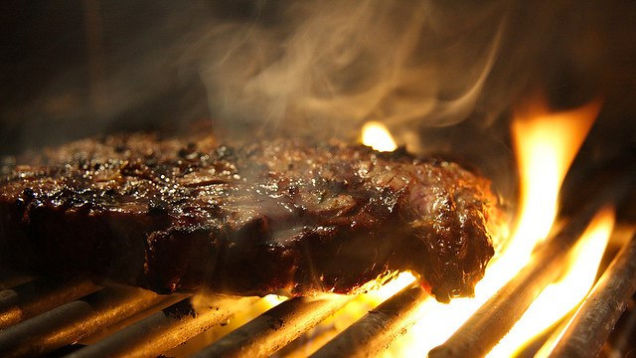
The barbeque grill has a long history. Since arriving in Geneva, we have always wanted to try but was a little apprehensive about the whole thing. We knew it was a usual summer past time but our apprehension ranged from how to use the grill to whether we were allowed to do it. We finally took the chance and did it. Read on and discover how we fared in our first attempt at grilling.
The BBQ is a simple affair in the Solomons. You can literally start a fire anywhere, throw a piece of steel plate propped by concrete bricks over the fire. Add oil, then throw the meat on top of the plate and wait for it to cook. At picnics, the BBQ cannot be missed. That was what we were used to. This is grilling – there is a difference!
So last week, we summed up enough courage to try some grilling. Perhaps, also spurred on by the reminder that our friends are planning a picnic this weekend and I being the one with a BBQ grill will bring it to the picnic. So at least I should have some idea on how to operate the grill and what to do at the picnic.
The equipment is simple, it is a hemispherical design which according to Wikipedia was initially called the Sputnik. And if you can imagine the Sputnik, there is no other fitting description. There is a metallic grill on which the food goes and the hollow pit below that on which the charcoal goes. The equipment is all held together by three sturdy legs.
I know from the Solomon’s that lighting charcoal is difficult but these charcoal were the most difficult ever. After stubbornly attempting to light the charcoal with a tiny lighter for a few minutes, I took my wife’s friendly advice and used the lighter (imagine a slow burning, big matchstick) she had bought from the local “supermarche“! It sprang to life and soon enough the charcoal caught fire and the heat it generated was ridiculously hot!
Today, was the third time we had attempted to grill our food and it was by far the best of our three attempts. The food was tastier, no oil was used and the grilled vegetables were a definite hit.
So what have we learned? Well, after a few scratches and burns on the sole of my feat and hands, I can say that this is one tradition we will continue next summer. Hopefully, this years experience should help us get better next year.
Now where is that left over grilled corn from dinner?
I will be looking forward to reading your comment on the “post roaster stage” Lynnold. Thanks!
In fact you are right. The UN puts this in its letter/email when they officially inform candidates of their placement on the roster. Being on the roster does not guarantee you will be employed by the organization. My personal opinion is the process needs to be strengthened so that candidates are recruited easily from the roster. As it is, HR and the hiring manager have a lot more power over the process and this causes back logs on the roster. There are candidates who have been on the roster for so long, it seems like they will never get a chance. I am very hopeful that the YPP will enhance the process. I am also hopeful that the SG’s directive to clear the roster is closely followed by managers and HR. When I have time, I will write a little more about the process now that I have a better inside look at the process
Thanks so much for your quick response, Lynnold. I asked you that because I really got confused about the interviews. I feared that after being placed in the roaster, still there would be chances of actually not getting a job in the UN.
All the best, and once again, thanks for your blog.
Maria M.
Hi Maria, thanks for stopping by. The simplest answer is you will be invited to as many interviews until you are placed. It may be worthwhile to write about the NCRE/YPP post interview so I can hopefully shed some light into the process. All the best, hope you get an interview soon, Lynnold
Hi Lynnold! I have also come across your blog while searching for some information on how much time goes by since you are placed in the roaster until the UN actually calls you or emails you with a job offer.
I passed the NCRE 2010 (both the written examination and the interview) and I was notified I was placed in the roaster in July. I haven´t heard a word from the UN since then.
I have also read in one of your posts that being in the roaster is not the end of the process, that one must yet undergo another interview. Do you know if you are called more than once for an interview in case they do not select you for the first post offered?
Thanks so much in advance.
Maria M.
Hello Sheemah, I cannot say for sure. Applications normally close in September then the exams are held in December (winter). I think they usually give candidates at least 2 months to prepare for the exams so probably early October would be about right. Reading any of my earlier posts about the NCRE and its comments, you can figure that out too. All the best, Lynnold
Hey Lynnold, I cam across your blog while searching for answers to questions about the UN YPP program (formerly NCRE) which, of course, weren’t covered on the UN website itself, surprise, surprise. I wanted to know how long it took to be shortlisted to actually sit the exam; after you submit your application for evaluation/pre-screening.